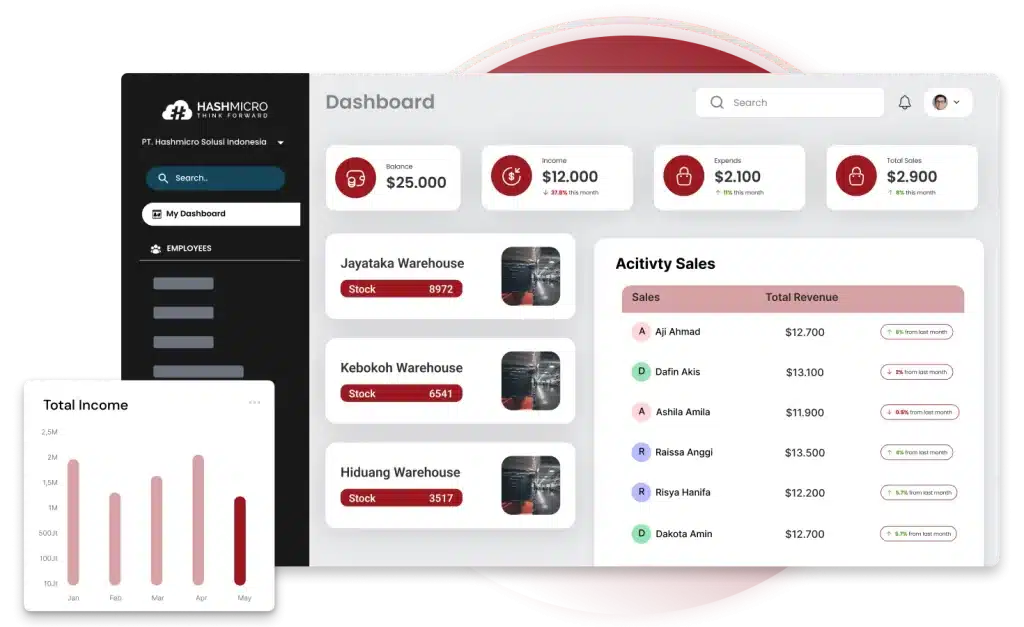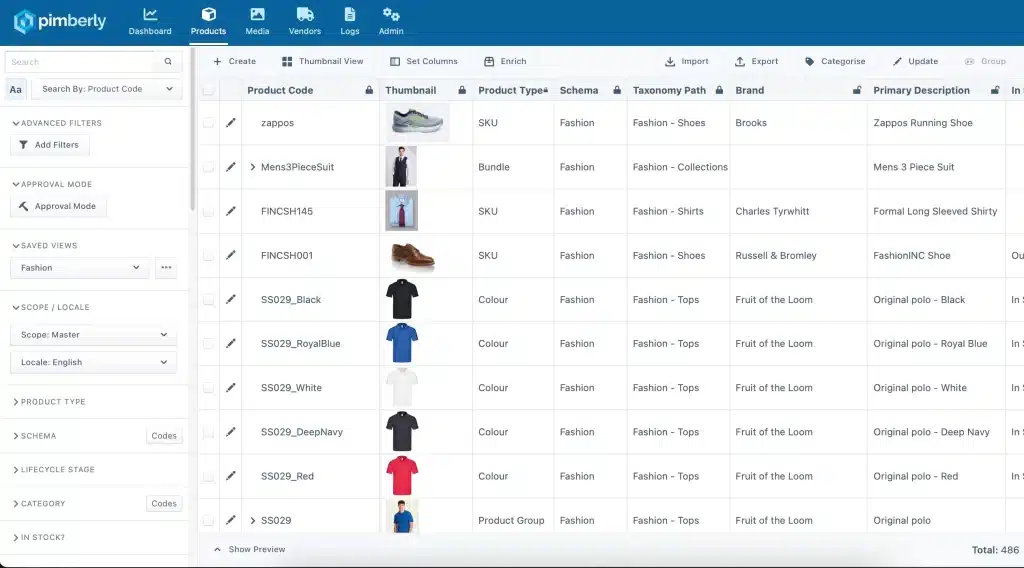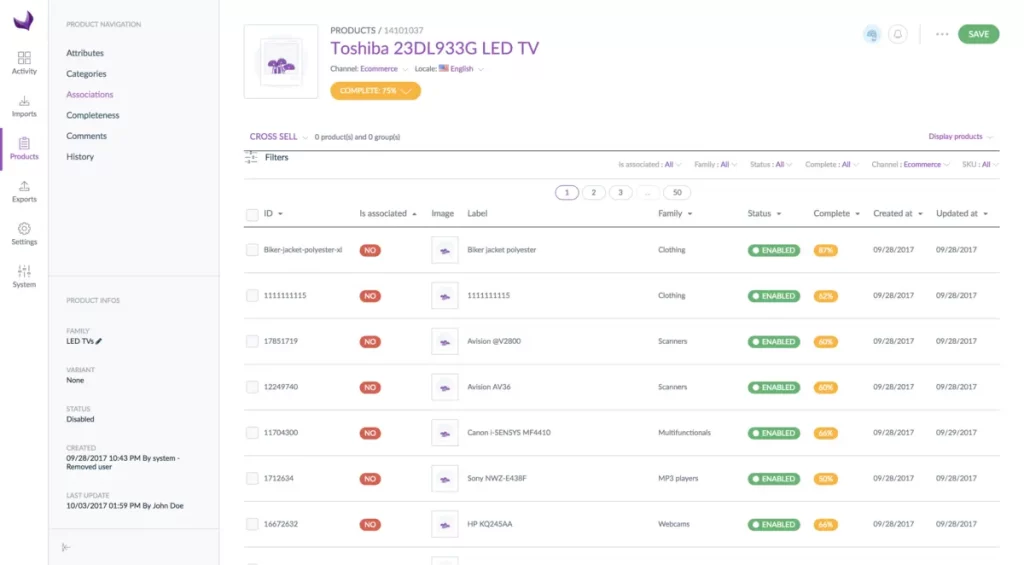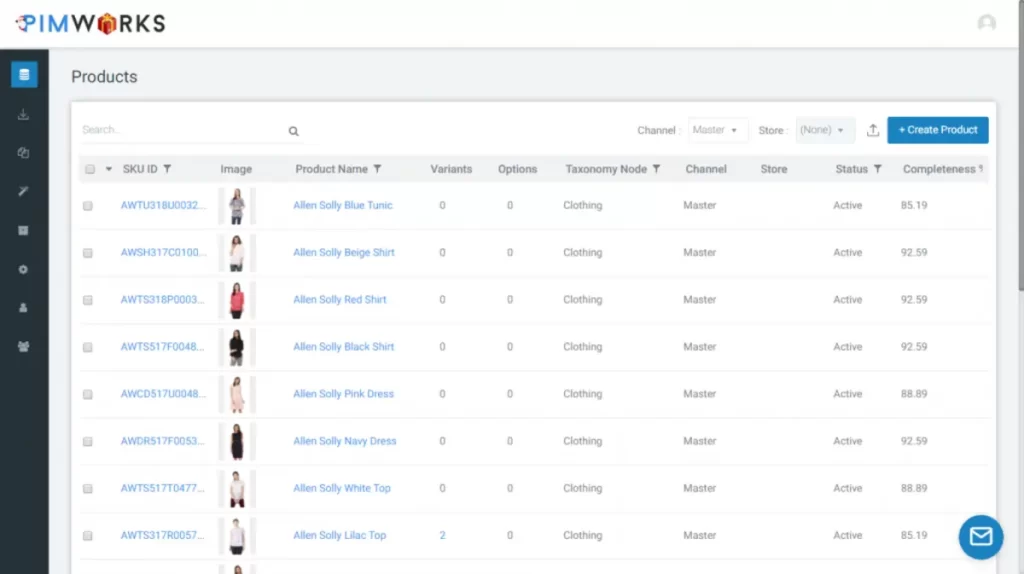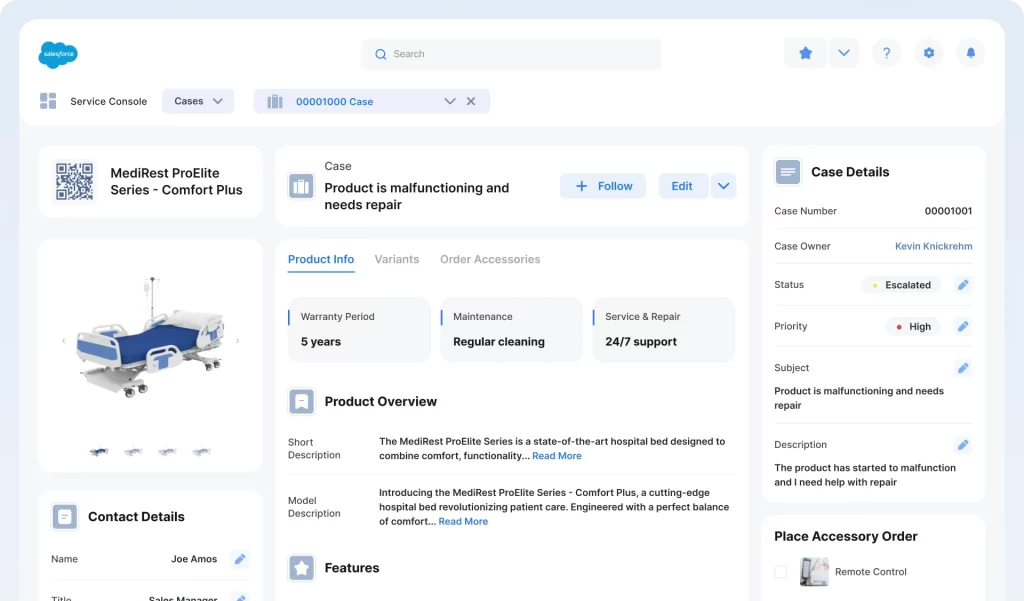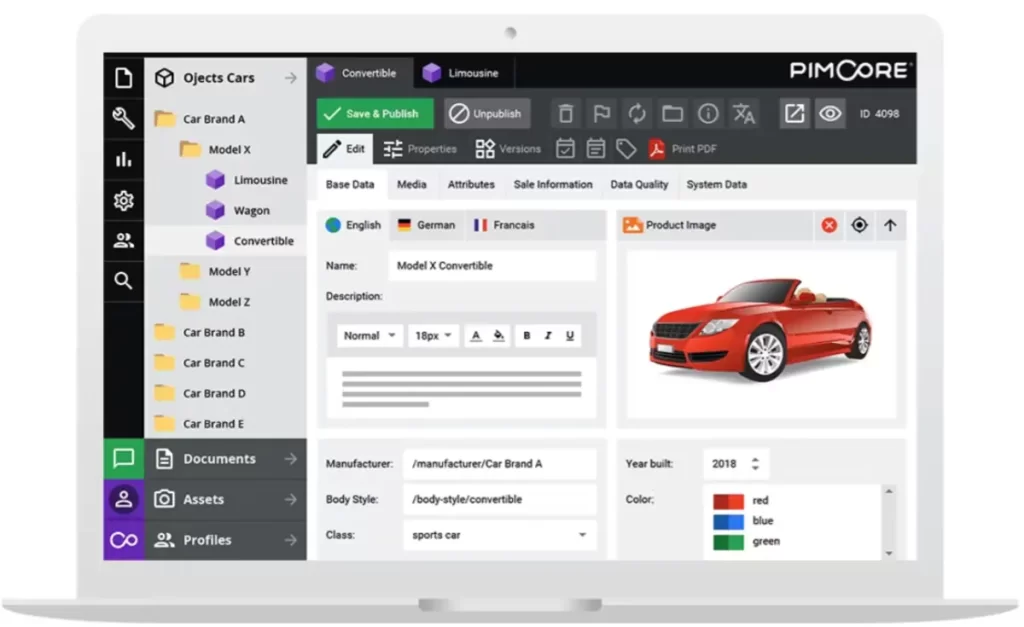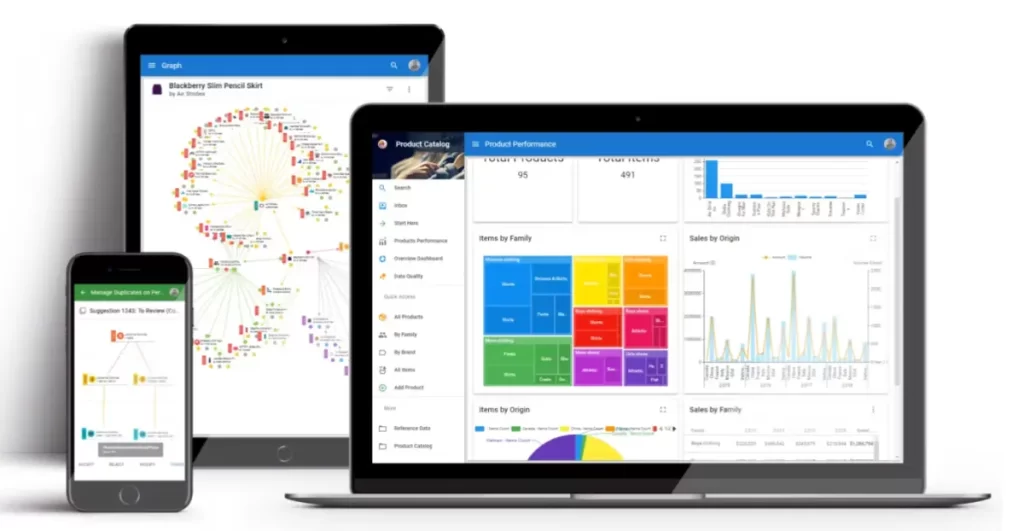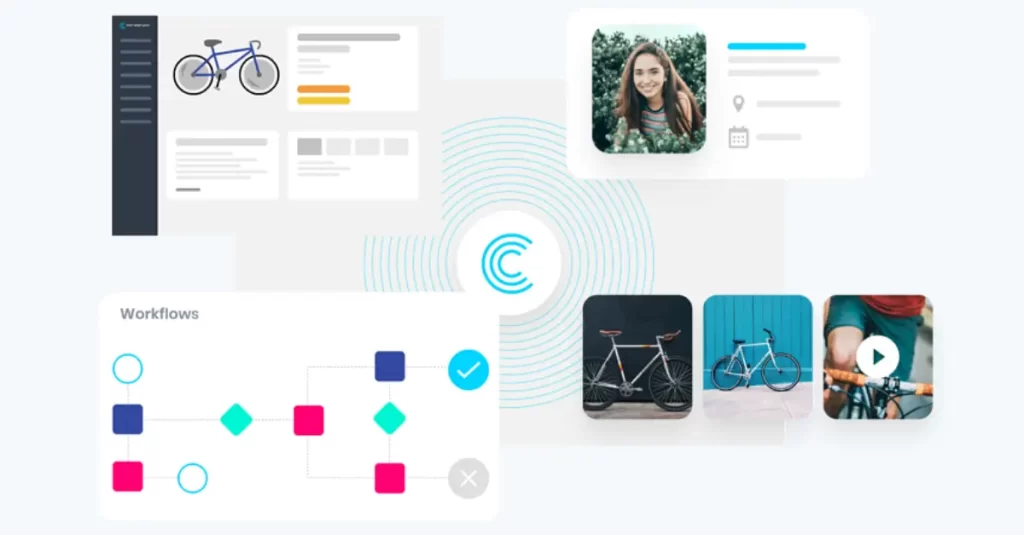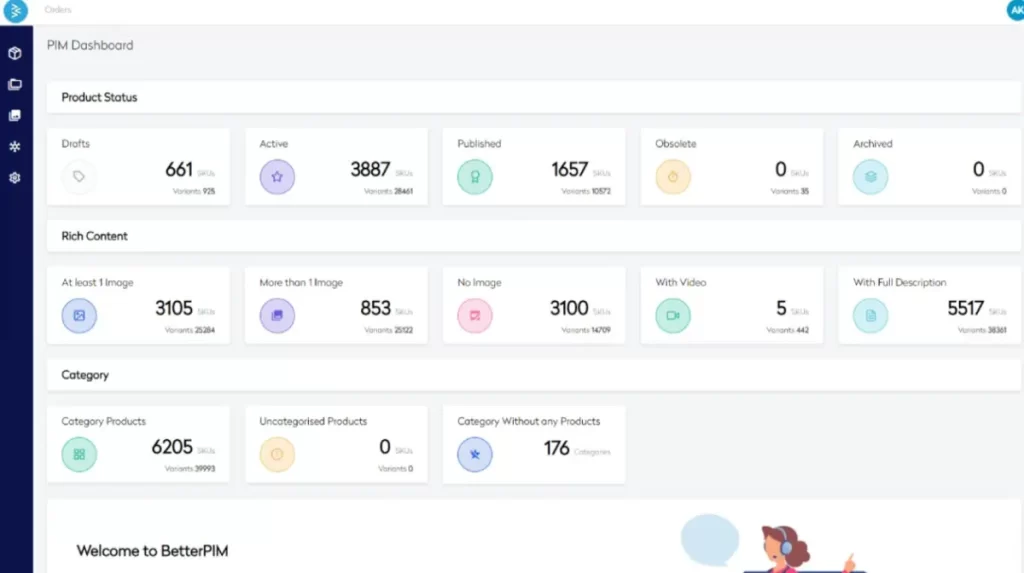Aren’t you tired of the struggle to manage and synchronize your product information across multiple channels? From retailers to manufacturers, the challenge of keeping product details accurate, consistent, and accessible can be overwhelming.
Product information management software is a solution for companies drowning in data chaos. PIM software streamlines the organization, storage, and retrieval of product information, ensuring all employees have the most accurate and up-to-date data.
However, with many PIM software options available, businesses often struggle to identify which best suits their specific needs. This article will provide the 15 best product information management software in the Philippines to guide you through the complex landscape.
Key Takeaways
|
Table of Contents

What is Product Information Management Software?
Product Information Management (PIM) software is a modern tool for managing all product-related data. The software integrates various data types, including descriptions, specifications, multimedia content, and pricing, into a single platform.
Understanding the PIM meaning can transform how you manage your business’s product data. Implementing PIM software to your business offers several benefits, which include:
- Reduces operational costs by minimizing manual data entry and corrections.
- Keeps product information uniform across all platforms, thus reducing errors.
- Saves time and resources, facilitating quicker product updates and launches.
- Easy management of large data volumes as business and product ranges expand.
- Creates a collaborative platform for departments, ensuring coordinated efforts.
- Maintain accurate product records, supporting compliance with industry standards.
15 Best Product Information Management Software in the Philippines
Choosing the right PIM software is crucial, as it significantly impacts operational efficiency and growth. Below are the 15 best product information management software in the Philippines to help you choose the software that aligns with your business requirements.
1. HashMicro Product Information Management Software
HashMicro Product Information Management Software is a part of Hash Core ERP that streamlines the management of product information across various channels. The software integrates core aspects of business management, including POS, inventory, and CRM.
HashMicro offers a free product tour and consultations with expert teams, allowing potential users to understand how the software can be tailored to their specific needs before making a commitment.
Trusted by prominent companies such as Forbes, Danone, and Abbott, HashMicro has proven its ability to handle diverse business environments. The trusts highlight the software’s reliability and credibility in delivering high-quality ERP solutions.
Let’s take a closer look at the comprehensive suite of features that HashMicro PIM offers:
- Built-in Business Intelligence (BI): This feature provides comprehensive data analysis capabilities. It grants access to data visualizations and real-time reporting, which is essential for maintaining effective and accurate product information management.
- Dashboard Ninja: The software includes customizable dashboards that allow users to effectively monitor key performance indicators (KPIs) and other crucial metrics. This functionality helps organize and visualize critical data seamlessly.
- Sheet Management: This feature improves document workflows by integrating essential documents directly into the PIM system. This integration ensures that all product-related documents are easily manageable and consistently up-to-date.
- Mobile Apps: HashMicro ERP’s mobile apps provide remote access to the PIM system, ensuring that users can manage and update product information effectively while on the move.
- Multi-Language Support: The multi-language support enables effective access and utilization by a global team, facilitating smooth operations across different regions and minimizing language barriers in multinational settings.
- AI-Generated Reports & Explainers: The system offers in-depth analysis, aiding in the understanding of complex product trends and automating report generation. This feature provides detailed insights that help manage a vast array of product data efficiently.
Pros:
- Intuitive and easy-to-navigate interface
- Highly customizable to fit business needs
- Robust integrations with HashMicro modules and other systems
- 100% unlimited users without additional user fee
- Lifetime after-sales service and maintenance
Cons:
- The implementation process can be lengthy for businesses with complex requirements
- Free demo queue may take time due to high demand
Discover how HashMicro’s best ERP software can enhance your product information management. Click on the banner below to view the pricing schemes and start streamlining your product management today!
2. Plytix
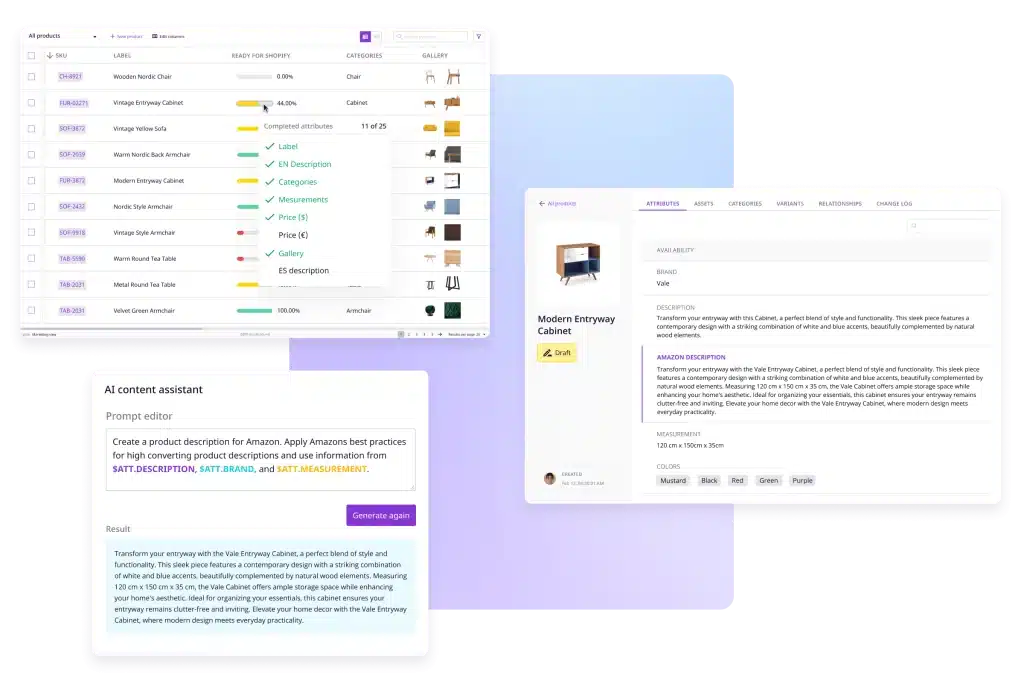
Key features include digital asset management, multichannel data syndication, and advanced filtering capabilities. The software enables users to create custom product catalogs, automate the distribution of product content, and generate performance analytics.
Pros:
- User-friendly interface
- Accessible from anywhere with an internet connection
- Responsive and helpful customer support
Cons:
- Lack of features, such as hiding attributes for specific products and using workflows
- The exporting feature has limitations regarding image size
- Limited customization options
3. Salsify
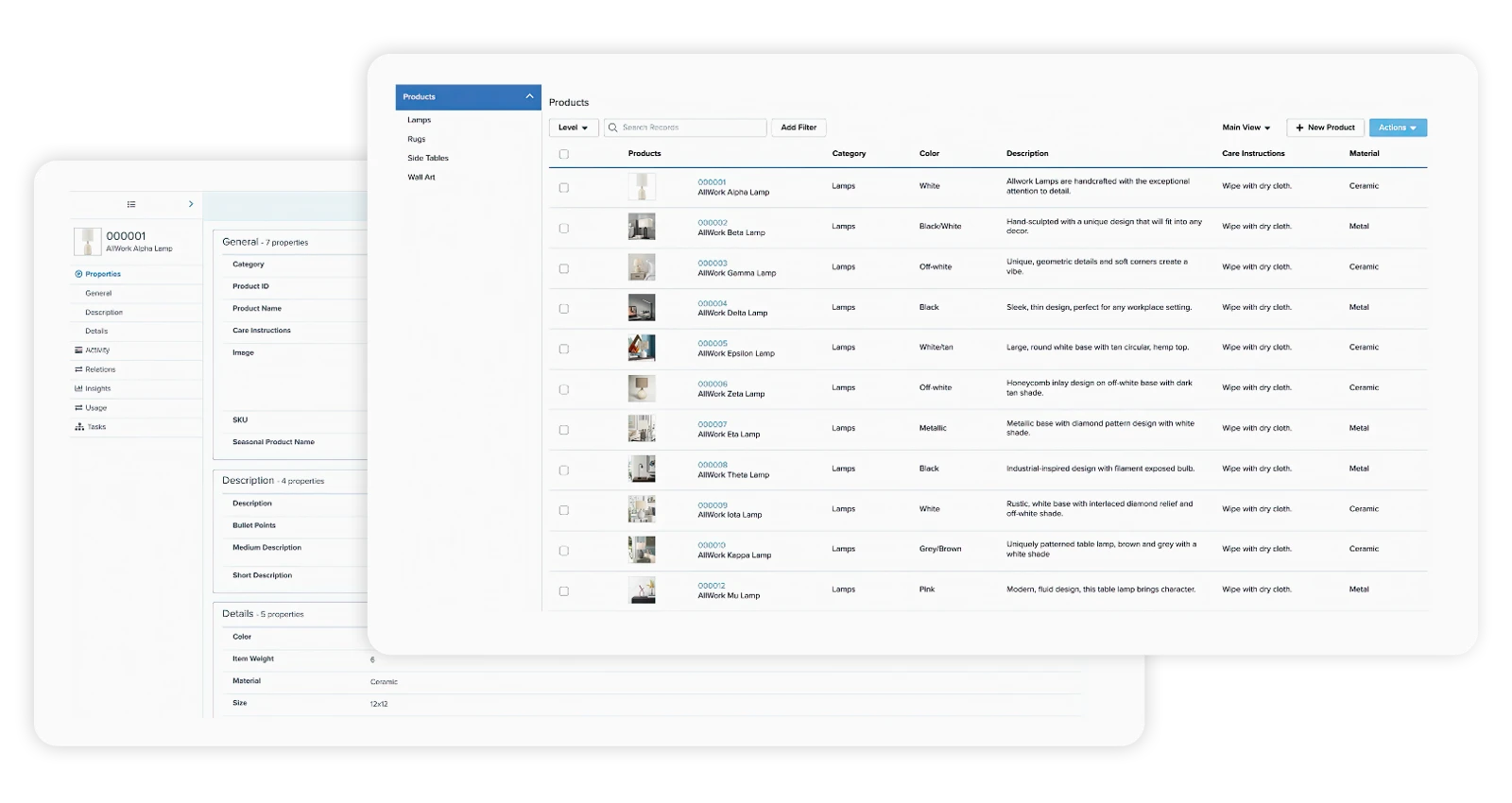
The platform offers features such as dynamic product catalogs, real-time content updates, and integrations with major e-commerce platforms. This allows businesses to maintain accurate and persuasive product listings, ensuring consistency and compliance across all sales channels.
Pros:
- Ease of use
- Offers robust data governance and control capabilities
- Excellent customer support
Cons:
- The steep learning curve requires significant investment in training and onboarding
- The screen may occasionally reload to a blank, especially under heavy load
- Some users have noted the absence of specific analytics and customization options
4. inriver
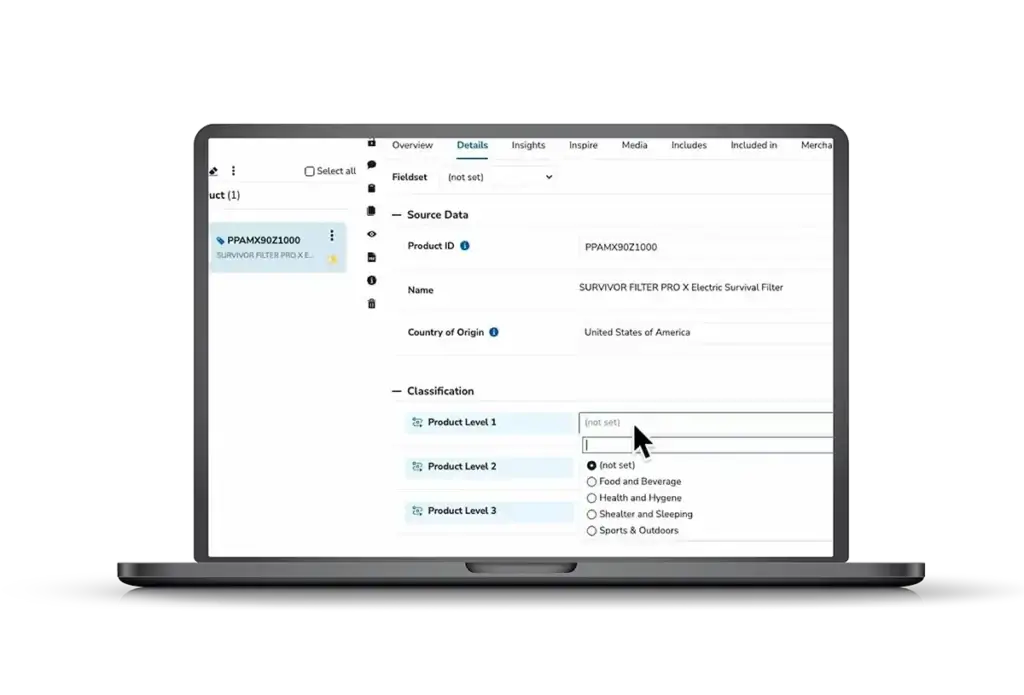
Features of inriver PIM, such as multi-language support, channel-specific content adaptation, and high-quality data governance, ensure that product information is accurate and engaging across all customer touchpoints.
Pros:
- Intuitive design
- The implementation process is straightforward
- Responsive and reliable customer support
Cons:
- The pricing may be a concern for businesses with a limited budget
- There can be a learning curve during the initial setup and onboarding process
- Limited customization options
- Users may experience performance issues, such as slow loading times or difficulty sorting large queries
5. ClickUp Product Information Management Software
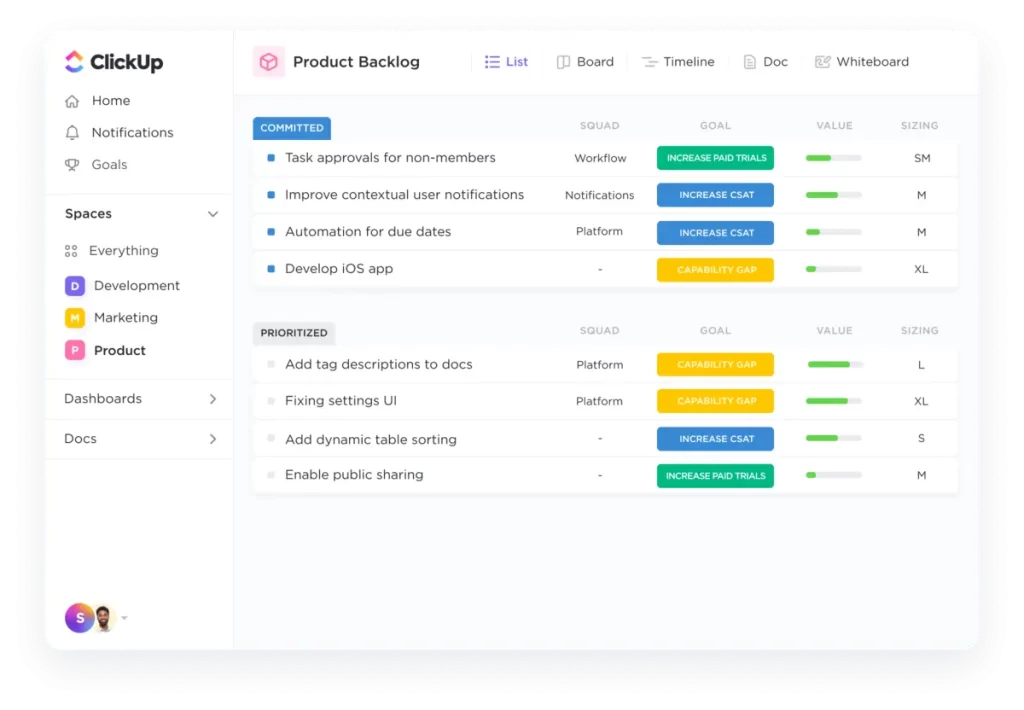
Key features of ClickUp’s PIM include customizable data fields, automated workflows to streamline data entry and updates, and robust reporting tools. This integration enables businesses to maintain comprehensive oversight of product information.
Pros:
- Offers multiple views, including Kanban, Gantt, timeline, list, and calendar
- Customizable with options for custom fields, themes, and descriptions
- The platform is constantly improving, with new customer-requested features being released regularly
Cons:
- The extensive features can make the software challenging to learn and navigate, especially for new users
- Lacks certain features like a project message board, which some competitors offer
- Some users report glitches, particularly with the Android app
6. Pimberly SaaS PIM & DAM
In any product information management software comparison, Pimberly stands out as a cloud-based PIM and DAM system that automates the processes of collecting, managing, and enriching product data, as well as distributing it to sales channels and e-commerce platforms.
The software offers workflow automation, dynamic product feeds, and localization features that support global sales strategies. Pimberly’s ability to handle unlimited SKUs and product attributes helps improve data consistency and reduce time-to-market.
Pros:
- Intuitive and user-friendly interface
- Integrates seamlessly with other systems
- Extensive customization options
Cons:
- The pricing of Pimberly may be a concern for businesses with a limited budget
- There can be a learning curve during the initial setup and onboarding process
- Some users have reported slow performance and time delays, especially when handling large volumes of data
7. Akeneo PIM
Akeneo PIM is one of the top product information management software vendors. It offers powerful tools to consolidate, enrich, and manage product data. It supports both cloud and on-premise deployments, making it flexible for various business needs.
Features of Akeneo include multi-language support, quality control tools to maintain high data standards, and channel-specific data output capabilities. This allows businesses to tailor product information for different markets and platforms, ensuring optimal product presentation.
Pros:
- Intuitive and user-friendly interface
- Akeneo has a large and active community, which is beneficial for new users seeking support and resources
- Seamlessly integrates with various e-commerce platforms like Magento and Shopify
Cons:
- Limited customization options
- There are occasional issues with attribute management, which can affect the overall data organization
- Some users feel that the software lacks flexibility in certain areas
8. PIMworks
PIMworks is one of the best product information management software focusing on centralizing and harmonizing all product information. This centralization makes it easier for businesses to manage and distribute accurate product data across multiple sales channels.
The software provides features such as digital asset management, data synchronization, and analytics tools that help monitor product performance across different platforms. PIMworks improves operational efficiency by reducing manual data entry and improving data accuracy.
Pros:
- Intuitive and easy-to-navigate interface
- It integrates with major retail platforms like Shopify, BigCommerce, and Amazon
- The software promotes teamwork with workflows and collaboration tools
Cons:
- Some users find the pricing of PIMworks to be on the higher side
- The overall implementation process can be time-consuming
- Limited customization options
9. Pimly
Pimly offers a streamlined approach to product information management aimed at businesses seeking to improve their product data processes. Its intuitive interface and essential PIM functionalities make it accessible to newcomers.
Key features include primary DAM, straightforward integration capabilities with e-commerce platforms, and simple workflows for product data enrichment and publication. Pimly is an effective entry-level option for companies that need basic PIM capabilities.
Pros:
- The software is intuitive and easy to use
- It includes an AI assistant for product data enrichment
- Seamlessly integrates with Salesforce data and applications
Cons:
- Some users find the pricing of Pimly to be on the higher side
- Limited integration capabilities with non-Salesforce tools
- There are reports of insufficient documentation, which can make it challenging for new users to get started
10. Pimcore Product Information Management Software
Pimcore Product Information Management Software offers a solution for managing complex product information and digital assets. It is well-suited for enterprises that require a highly adaptable platform to integrate with their unique business processes and IT infrastructure.
The software features data modeling capabilities, a multi-vector digital asset management system, and advanced analytics to track product data quality and usage. Pimcore’s API-driven approach allows for seamless integration with existing business systems.
Pros:
- Being open-source, Pimcore offers significant flexibility of the system
- It integrates well with external services
- Extensive customization options
Cons:
- Some users find the user interface to be less intuitive and in need of improvement
- The lack of predefined templates for Content Management System (CMS) and limited theming options
- Requires professional advice for customization and implementation, which can add to the overall cost and time
11. Semarchy
Semarchy is an intelligent data hub that includes PIM capabilities, designed to handle complex data challenges of large enterprises. It uses a unique approach of leveraging machine learning and data governance to improve data integrity and operational efficiency.
The platform offers strong master data management (MDM) features, including data integration, quality control, and governance tools. Semarchy is ideal for businesses that need a system to manage not only product information but also customer and supplier data.
Pros:
- Web-based design and intuitive interface
- The platform allows for quick deployment
- Excellent customer support team
Cons:
- The cost of implementing and maintaining Semarchy can be high
- There can be a steep learning curve for new users
- Customizations can be complex and time-consuming
12. Contentserv Product Experience Cloud
Contentserv offers tools to enhance the product experience management process. It focuses on delivering personalized product content that resonates with customers and drives sales. The platform is ideal for companies that emphasize brand storytelling and customer engagement.
Key features include dynamic personalization, content automation, and in-depth analytics to track content performance. It provides a holistic approach to managing product information, ensuring that each customer touchpoint is optimized for engagement and conversion.
Pros:
- Intuitive and easy-to-use interface
- Supports cloud deployment, which can help reduce IT infrastructure costs
- Strong integration options with other systems
Cons:
- The cost of implementing and maintaining Contentserv can be high
- There can be a learning curve for new users, especially those unfamiliar with PIM systems
- Implementing very complex data models can present challenges and may require additional effort to configure
13. BetterCommerce
BetterCommerce provides PIM software that offers a seamless experience from product management to digital sales. The software includes a digital commerce solution for robust product information management.
The system includes features like inventory management, channel-specific content management, and integration with sales and marketing tools. It benefits retailers, brand owners, and wholesalers who require a platform to manage e-commerce operations efficiently.
Pros:
- The software is highly scalable
- It integrates well with other systems, such as ERP, OMS, and third-party applications
- Responsive and helpful customer support
Cons:
- The implementation and maintenance costs of BetterCommerce can be higher compared to some competitors
- Customization can be complex and time-consuming
- Users have experienced performance slowdowns when handling large datasets or complex workflows
14. Precisely EnterWorks
Precisely EnterWorks offers a comprehensive PIM solution that excels in multi-domain data management for businesses looking to enhance their product and company data alignment. It is well-suited for businesses with complex needs and multi-channel distribution requirements.
Its capabilities include robust workflow management, dynamic data modeling, and support for complex data syndication. EnterWorks is geared toward businesses that need to maintain a high level of precision and consistency in their product information across diverse markets.
Pros:
- Highly scalable
- It integrates well with other systems, including ERP and CRM
- Strong customer support
Cons:
- High implementation and maintenance costs
- Customizing the platform to meet specific business needs can be complex and time-consuming
- There can be a learning curve for new users, especially those unfamiliar with PIM systems
15. Surefront Product Information Management Software
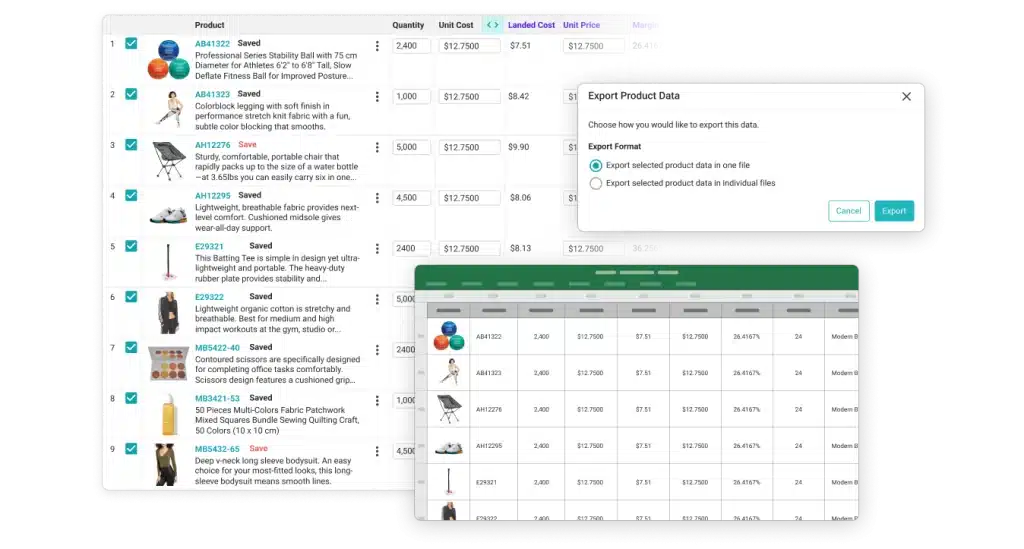
The system provides features such as integrated quoting, real-time collaboration tools, and a unified platform for all product-related communications. Surefront helps businesses reduce time-to-market and improve coordination among stakeholders in product management.
Pros:
- Ease of use
- Surefront allows for the customization of user-defined fields and types
- Excellent customer support
Cons:
- The cost of Surefront can be a consideration, especially for smaller companies
- Some users have noted that certain features are not available on mobile devices
- There can be a learning curve for new users to utilize all its features fully
Features to Look for in PIM Software
When choosing the right Product Information Management (PIM) software for your business, knowing which essential features can make a significant difference. Here are some of the critical features to keep an eye out for:
1. Data management capabilities
A top-tier PIM system should provide comprehensive tools for managing and organizing vast product data. Look for features that allow you to easily import, export, edit, and delete information, ensuring data consistency across all platforms.
2. Integration with other systems
Seamless integration with other business systems, such as ERP, Point of Sale (POS), CRM, and e-commerce platforms, is crucial. This ensures that all product information remains synchronized across various departments, enhancing workflow efficiency.
3. Multi-channel support
As businesses expand their sales channels, it’s essential that PIM software can support and manage product information across all these channels. This feature ensures that your product data is consistent, whether it’s on your website, mobile app, or third-party marketplaces.
4. Quality and compliance management
The software should include tools that help maintain data quality and ensure compliance with various industry standards and regulations. This is particularly important for businesses in sectors like healthcare, where product information accuracy is critical.
5. Scalability
As your business grows, so will your product information management needs. The PIM software should be scalable to accommodate increased data volumes and additional users without compromising performance.
6. Data security
With the increasing risk of data breaches, robust security features are necessary. Look for software that offers secure access controls, data encryption, and user authentication to protect sensitive information.
How to Choose the Right PIM Software for Your Business
Choosing the right PIM software for your business involves more than just understanding its features. It requires a strategic approach to ensure the solution aligns with your specific needs and goals, which include:
- Identify your business needs: Identify your current product information management processes. Assess pain points, such as data inconsistencies, difficulty accessing information, or challenges managing data across multiple channels.
- Set your objectives: Determine what you aim to achieve with a PIM system. Are you looking to improve data quality, enhance team collaboration, or expand to more sales channels?
- Evaluate features: Refer to the previous section on essential features and match those with your specific needs. Prioritize software that offers the functionalities most critical to your operations.
- Check for integrations: Ensure that the PIM software integrates well with other tools, such as ERP, CRM, and e-commerce platforms. Integration capabilities can greatly influence the effectiveness and efficiency of your data management.
- Read reviews and case studies: Look for reviews, testimonials, and case studies from similar businesses. Insights from other users can provide valuable information about the software’s reliability, customer support, and real-world application.
- Consider vendor support and community: Good vendor support can be crucial, especially during the implementation phase. Consider vendors who offer comprehensive support and have an active community where you can share insights and solutions.
By following these steps, you can select a PIM software that not only fits your current needs but also supports your business as it grows and evolves. This approach ensures that you invest in a solution that enhances your product information management and overall efficiency.
Conclusion
Choosing the right product information management software is crucial to streamlining product data management processes. The right PIM software enhances data accuracy across various platforms and boosts operational efficiency and market responsiveness.
HashMicro PIM software, a vital component of the Hash Core ERP system, stands out as a comprehensive solution. From customizable dashboards and AI-generated reports to multi-language support, Hash Core ERP caters to the dynamic needs of modern businesses.
To see how Hash Core ERP can transform your product information management, sign up for a free demo now and get the chance to consult your business needs with our professional team.
FAQ about Product Information Management Software
-
Who uses PIM software?
Retailers and distributors can utilize it similarly to e-commerce and data teams or, in certain instances, relay data back to their suppliers.
-
Is PIM an ERP system?
No, a PIM system is not an ERP system. PIM focuses solely on managing product data like descriptions and specifications, ensuring channel consistency. ERP systems manage broader business processes, including accounting, HR, CRM, and inventory. While PIM can be part of an ERP system, it is distinct and specialized in its function.
-
Is PIM a SaaS?
A PIM can be offered as Software as a Service (SaaS), but it’s not limited to this model. PIM systems are also available on-premises or as hybrid solutions. The SaaS model is popular for its scalability, ease of use, and reduced initial costs.



